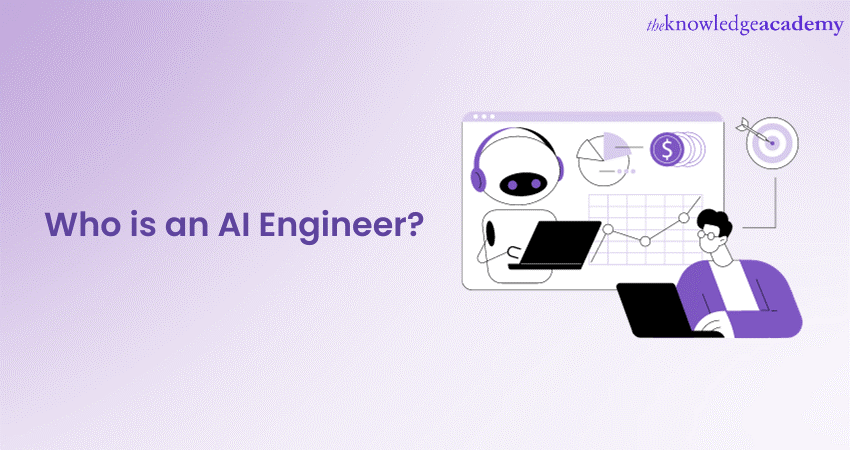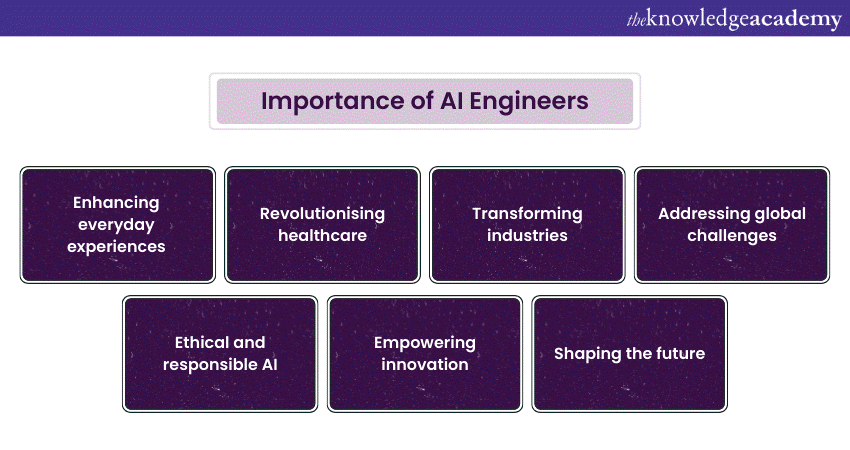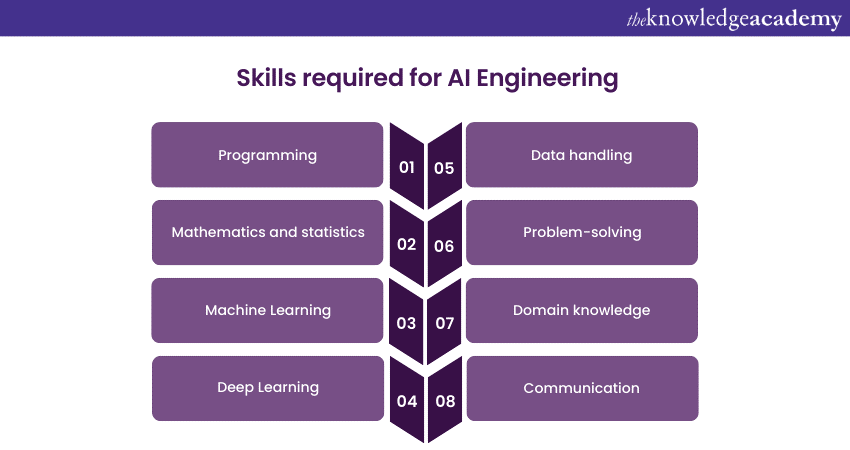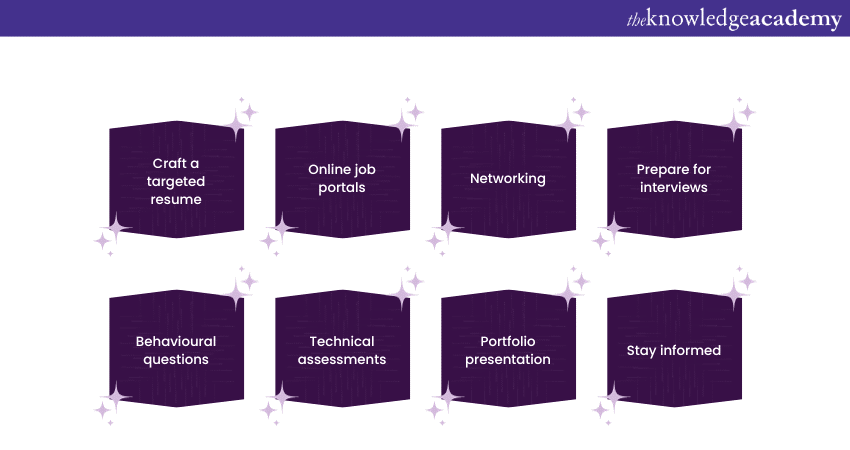We may not have the course you’re looking for. If you enquire or give us a call on 01344203999 and speak to our training experts, we may still be able to help with your training requirements.
Training Outcomes Within Your Budget!
We ensure quality, budget-alignment, and timely delivery by our expert instructors.

Have you ever wondered how computers can do intelligent things, like recognising your voice or suggesting movies you might like? Well, some people called Artificial Intelligence Engineers make all of that happen!
According to Glassdoor, the salary for an AI Engineer is £57,632 per year in the United Kingdom. This showcases that AI Engineers are highly valued in the engineering industry today. If this field interests you, it’s time to familiarise yourself with the job role and how to become one. Read this blog to learn about who is an Artificial Intelligence Engineer, how you can become one and build a strong career in the industry.
Table of contents
1) Artificial Intelligence Engineer: An overview
2) The importance of AI Engineers
3) Role and responsibilities of AI Engineers
4) How to become an Artificial Intelligence Engineer?
a) Skills required for the role
b) Educational requirements
c) Certifications
d) Technical knowledge
e) Job search and interviews
5) Conclusion
Artificial Intelligence Engineer: An overview
An AI Engineer is an expert dedicated to crafting smart computer systems. They are entrusted with the task of conceiving, crafting, and deploying algorithms and models that empower machines to execute functions typically associated with human intelligence. These functions encompass a wide spectrum, from the recognition of speech and images to the ability to make intricate real-time decisions. To understand the importance of AI Engineers, it's essential to grasp AI's incredible impact on various aspects of our lives.
Unlock the future with our Artificial Intelligence & Machine Learning Course – Empower your possibilities today!
The importance of AI Engineers

Here are some reasons why AI Engineers are important:
a) Enhancing everyday experiences: AI is behind the personalised recommendations you receive on streaming platforms, the voice assistants that respond to your commands, and the navigation systems that help you find the quickest route home. AI Engineers make these experiences more convenient and enjoyable.
b) Revolutionising healthcare: In the medical field, AI is aiding in disease diagnosis, drug discovery, and treatment planning. AI-driven systems can analyse vast amounts of medical data quickly, assisting healthcare professionals in making more accurate and timely decisions.
c) Transforming industries: AI is reshaping finance, manufacturing, and transportation industries. AI Engineers develop algorithms that optimise trading strategies, automate production processes, and even power self-driving cars, making these industries more efficient and safer.
d) Addressing global challenges: AI is being used to tackle some of the world's most pressing issues, from climate change to poverty. Engineers are developing AI-driven solutions to predict natural disasters, optimise energy consumption, and analyse social data to inform policy decisions.
e) Ethical and responsible AI: As AI becomes more pervasive, AI Engineers play a critical role in ensuring that AI technologies are developed and used ethically. They are involved in discussions about bias mitigation, data privacy, and transparency to build trustworthy AI systems.
f) Empowering innovation: AI Engineers are the innovators of the digital age. They continually push the boundaries of what's possible, whether it's creating robots that assist in surgery, AI-powered virtual assistants, or machines that can understand and generate human-like text.
g) Shaping the future: AI is not just a tool; it's a driver of change. AI Engineers are at the forefront of shaping the future, contributing to advancements that redefine how we work, communicate, and interact with technology.
Unlock the power of AI and transform your projects. Join our Artificial Intelligence (AI) For Project Managers Course today!
Role and responsibilities of AI Engineers
Artificial Intelligence Engineers, or AI Engineers, are the architects and builders of intelligent systems. They play a pivotal role in the development and implementation of AI technologies. Let's explore the key responsibilities that define their role and explore the essential skills required to excel in this dynamic field:
Key responsibilities of an AI Engineer
AI engineers are professionals who design and implement intelligent systems and applications using artificial intelligence, machine learning, and data science techniques. They are responsible for:
a) Algorithm development: AI Engineers are tasked with designing and developing algorithms that enable machines to perform specific tasks. These algorithms can range from natural language processing for chatbots to computer vision for image recognition.
b) Data preparation and analysis: Working with large datasets is a fundamental aspect of AI Engineering. Engineers clean, preprocess, and analyse data to extract meaningful insights and train AI models effectively.
c) Model development: Building Machine Learning and Deep Learning models is at the core of an AI Engineer's role. They select the appropriate algorithms and frameworks and fine-tune models to achieve desired outcomes.
d) Integration: AI Engineers integrate AI solutions into existing systems or applications. This involves ensuring that AI models seamlessly work with other software components.
e) Testing and evaluation: Testing and evaluation of AI systems are essential to ensure their accuracy and performance. Engineers design experiments, validate models, and refine them based on feedback.
f) Optimisation: Continuous improvement is key. AI Engineers optimise algorithms and models to enhance efficiency and reduce resource requirements, making AI applications more practical.
g) Monitoring and maintenance: After deployment, AI Engineers monitor system performance, detect issues, and perform maintenance tasks to keep AI solutions running smoothly.
How to become an Artificial Intelligence Engineer?
To become an Artificial Intelligence Engineer, you need to have a strong background in programming and AI techniques. You also need to pursue a degree or relevant certifications in AI-related fields. Apart from this, you need to have certain skills and other qualifications. Here's a complete breakdown of how to become an Artificial Intelligence Engineer:
Skills required for the role

AI Engineers need skills in programming, data science, mathematics, and AI techniques. Here are some skills necessary for AI Engineers:
a) Mathematics and statistics: Strong mathematical and statistical knowledge is necessary for understanding and creating AI algorithms. Concepts like linear algebra, calculus, and probability are frequently applied.
b) Machine Learning: A deep understanding of Machine Learning principles and algorithms is essential for model development and optimisation.
c) Deep Learning: Familiarity with Deep Learning frameworks like TensorFlow and PyTorch is crucial for building and training neural networks.
d) Data handling: Expertise in data preprocessing, data wrangling, and feature engineering ensures that AI models are trained on clean and relevant data.
e) Problem-solving: AI Engineers need strong problem-solving skills to tackle complex challenges and optimise AI systems effectively.
f) Domain knowledge: Depending on the industry, domain-specific knowledge can be invaluable for designing AI solutions that meet industry-specific requirements.
g) Communication: Effective communication skills are vital for collaborating with cross-functional teams and explaining AI concepts and results to non-technical stakeholders.
Elevate your Business Analysis skills today with our Artificial Intelligence (AI) For Business Analysts Course!
Educational requirements
Becoming an Artificial Intelligence Engineer typically requires a strong educational foundation in Computer Science and related fields. Here's an overview of the educational requirements, including academic background, recommended degrees and courses:
An academic background in Computer Science, mathematics, or a related field is a solid starting point for aspiring AI Engineers. Familiarity with foundational concepts in mathematics and programming is essential for success in this field. While there is no one-size-fits-all educational path, certain degrees and courses are highly recommended:
a) Bachelor's degree: A bachelor's degree in Computer Science, mathematics, Electrical Engineering, or a related field is a common starting point. It offers a robust grounding in programming, algorithmic principles, and mathematical fundamentals.
b) Master's degree: Many AI Engineers pursue a master's degree (M.Sc.) or a Ph.D. in Machine Learning, Artificial Intelligence, or Data Science. These advanced degrees offer specialised knowledge and research opportunities.
Certifications
Certifications can bolster your AI credentials and demonstrate your expertise. Some valuable certifications for AI Engineers include:
a) Machine Learning certifications: Offered by reputed organisations, these certifications cover machine learning fundamentals and practical applications.
b) AI Framework-Specific certifications: Certifications from AI framework providers like TensorFlow or PyTorch can validate your proficiency in using these tools.
Technical knowledge
Technical knowledge of AI Engineers is the ability to use programming languages, data science, mathematics, and AI techniques to design and implement intelligent systems and applications. AI Engineers must master the following programming languages along with certain tools:
Programming languages
Proficiency in programming languages is crucial for an AI Engineer. Python is a popular language due to its rich ecosystem of libraries and frameworks for AI and Machine Learning. Additionally, knowledge of languages like R and Julia can be beneficial for specific tasks.
AI frameworks and tools
AI Engineers work with various frameworks and tools to develop and deploy AI models. Some essential ones include:
a) TensorFlow: Developed by Google, TensorFlow is a versatile and widely used Deep Learning framework.
b) PyTorch: Developed by Facebook's AI Research lab, PyTorch is known for its flexibility and ease of use, especially in the research community.
c) Scikit-learn: This Python library is essential for classical Machine Learning tasks.
d) Keras: Often used in conjunction with TensorFlow, Keras provides a high-level API for building and training neural networks.
e) Jupyter notebooks: These interactive environments are ideal for experimenting with AI algorithms and visualising results.
Unlock the power of AI for DevOps with our Artificial Intelligence (AI) For DevOps Course and elevate your automation capabilities today
Job search and interviews

Here’s how you can start your job search and prepare for interviews:
a) Craft a targeted resume: Tailor your resume to showcase relevant AI skills and experiences.
b) Online job portals: Utilise platforms like LinkedIn, Indeed, and Glassdoor to find AI job listings.
c) Networking: Connect with AI professionals through networking events, conferences, and online communities.
d) Prepare for interviews: Study common AI interview questions and practice coding challenges.
e) Behavioural questions: Be ready to answer questions about problem-solving, teamwork, and adaptability.
f) Technical assessments: Expect coding tests and AI-related technical assessments during interviews.
g) Portfolio presentation: Showcase AI projects and explain their impact.
h) Stay informed: Keep up with AI trends and research to demonstrate your enthusiasm and knowledge during interviews.

Conclusion
Becoming an AI Engineer is an exciting journey that leads to shaping the future. With education, skills, and determination, anyone can thrive in this dynamic field, contributing to AI's remarkable impact on our world. Embrace the challenges, stay curious, and let your passion drive your AI engineering career forward.
Unlock the future with our Introduction to Artificial Intelligence Training – Start your AI Journey today!
Frequently Asked Questions
Upcoming Data, Analytics & AI Resources Batches & Dates
Date
 Introduction to AI Course
Introduction to AI Course
Fri 24th Jan 2025
Fri 28th Mar 2025
Fri 23rd May 2025
Fri 25th Jul 2025
Fri 26th Sep 2025
Fri 28th Nov 2025







 Top Rated Course
Top Rated Course


 If you wish to make any changes to your course, please
If you wish to make any changes to your course, please


